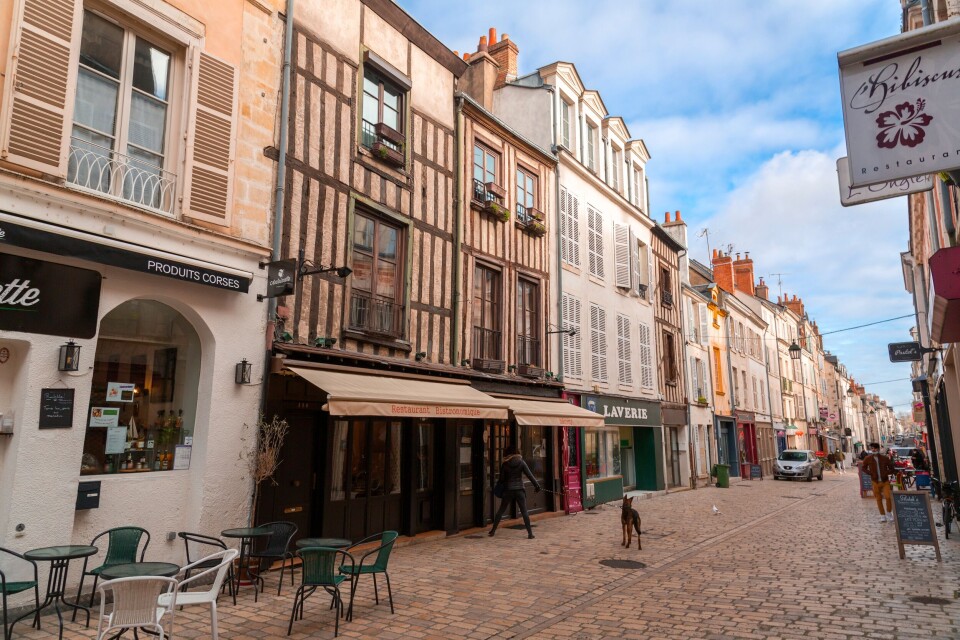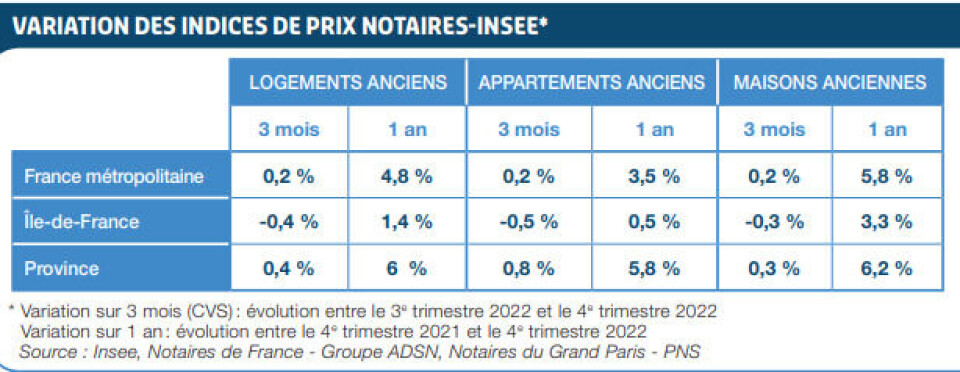-
Does a pool still add value to French property despite water restrictions?
An increased selling price might look attractive but do not forget running costs, increased taxes and water bans
-
Where in Paris is property becoming more affordable?
Seven arrondissements have now fallen below the €9,000 per square metre bracket
-
How quickly do homes near you go under offer in France?
68 days in Paris, 86 in Bordeaux: the average time is falling across much of the country
Latest data on how house prices have changed in your corner of France
New figures show a drop in values in the north of France. Price growth elsewhere has slowed

Property prices are falling in parts of northern France in the clearest indication yet that a housing slump is underway in the country.
That is according to the latest data from French notaires from the last quarter of 2022.
Prices of non-new houses dropped in eight cities or towns in the northern half of France, compared with values a year earlier.
Even in areas where housing prices increased, growth has slowed.
The data is compiled using the information from French notaires - who are involved in all property sales in France - giving the most complete set of information.
It covers the October-December period, the latest quarter for which figures are available.
The price falls come after house values had risen across the board previously, with Covid heralding a house sale boom in the country.
As well as property values falling in some areas, the number of sales is also dropping, another key indicator of how healthy the market is. In the 12 months to February, there were 1,083,000 sales, compared with 1,205,000 in August 2021. Notaires believe year-on-year sales will continue to drop below the one million barrier.
Here, we look at house price trends from the data, as well as plot a map to show how they have changed in your area.
North-south and coastal divides are present
In particular, the north has suffered from falling prices, whereas the south is seeing growth – albeit at a lower rate than previously.
No city south of Poitiers saw a fall in house prices – even if in major cities growth was low.
In the south, growth increases in the double figures were recorded in Corsica*, Toulon, and Montpellier, but were much lower inland.
The top three cities for average house prices were Corse-du-Sud (€516,300), Toulon (€486,000) and Lyon (€440,000) with Montpellier in fourth and Marseille/Aix-En-Provence in fifth, with house prices overall much higher in the south.
Growth, even in the north, was stronger in coastal areas – Brest and Le Havre saw prices shoot up by 14.5% and 18.2% respectively, even as other cities in Normandy and Brittany saw growth come to a complete halt (the growth rate was 0.0% in Nantes) or fall.
Read more: Warning for homeowners in France as monthly property prices fall
Some smaller cities see house prices boom
Despite the decreases measured in some cities, house price increases of between 14% and 21% were recorded in a number of smaller and mid-size cities.
Troyes (20.8%) saw the highest overall growth - Châteauroux (19.4%) and Le Havre (18.2%) round out the top three for house price rises.
The major cities of France - Lyon, Bordeaux, Lille, Nantes, Toulouse and Marseille/Aix-en-Provence* - all saw rises of under 3% (Paris and the surrounding area measured together and saw a rise of 3.3%), or house prices that had frozen completely, although none saw house prices fall.
Average price of properties barely sees a raise
Despite the overall growth in these smaller cities, the average price of non-new properties saw an increase of only 0.2% across France compared to the previous quarter.
This was driven by the fact that in the Île-de-France region, average property prices had fallen by 0.2%, and had only grown by 0.4% outside of the capital area.
In the previous quarter, the rise was recorded at 1.6% overall, and 0.6% in the capital, showing a noticeable drop in the current data.
Both average house and apartment prices fell in the capital region compared to the previous quarter.
Although year-on-year house price growth across France was 4.8% overall, this is considerably lower than the 6.4% year-on-year growth recorded for the third quarter of 2022.
This corresponds to the fall in house prices across France shown in the data and gives a bleak outlook for the coming quarter (that will record the first quarter of 2023).

Notaires predict that the downward trend of property sales will eventually lead to further falls in prices, although this will become more apparent in 2023’s data.
Read also: Dream of a detached house with garden fades in France
Drastic changes to previous data
The regional house price changes are particularly stark if compared to the previous notaire data for the third quarter of 2022.
Between July and September 2022, the year-on-year increase for house prices in Metz (10.6%), Dijon (7%) and Reims (4.6%) was stable and matched trends across the county.
But between October and December 2022, a drastic fall was noted in each city – year-on-year prices in Metz fell by 7%, in Dijon they lowered by 7.6%, and in Reims a huge 11.6% drop was recorded.
Only Châteauroux, Corse-du-Sud and Brest managed to record double-digit house price increases in both the July - September and October-December data.
Below, you can see a map showing the property prices and their year-on-year changes using our map.
*All data sets are for cities except in Corsica (which is on a departmental level of north and south Corsica), Guadeloupe and Martinique. Paris is measured as part of the Île-de-France conglomeration, and the cities of Marseille and Aix-en-Provence are combined into one data set.
Related articles
Tradespeople shortages, buy an island: 6 French property stories
Château, pavillon, villa: France’s property lexicon explained
























